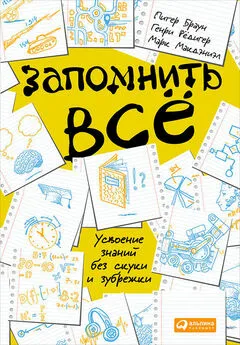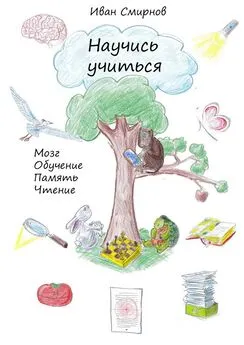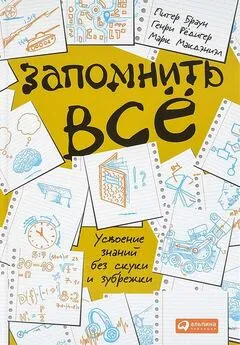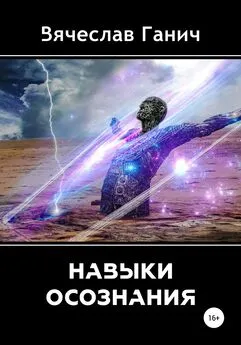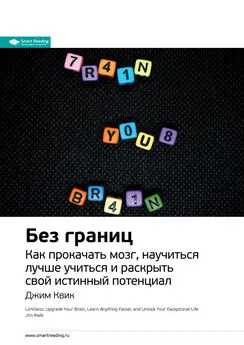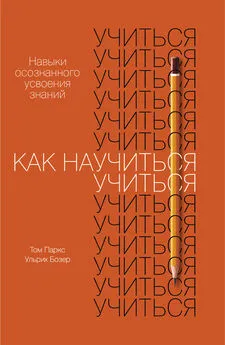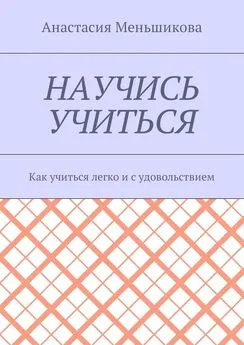Ульрих Бозер - Как научиться учиться [Навыки осознанного усвоения знаний]
- Название:Как научиться учиться [Навыки осознанного усвоения знаний]
- Автор:
- Жанр:
- Издательство:Альпина Паблишер
- Год:2020
- Город:Москва
- ISBN:978-5-9614-3365-4
- Рейтинг:
- Избранное:Добавить в избранное
-
Отзывы:
-
Ваша оценка:
Ульрих Бозер - Как научиться учиться [Навыки осознанного усвоения знаний] краткое содержание
Как научиться учиться [Навыки осознанного усвоения знаний] - читать онлайн бесплатно ознакомительный отрывок
Интервал:
Закладка:
Carpenter, Shana K., ed. «Improving Student Learning in Low-Maintenance and Cost-Effective Ways.» Journal of Applied Research in Memory and Cognition 3, no. 3 (2014): 121–123. doi: 10.1016/j.jarmac.2014.07.004.
Center for Teaching. Vanderbilt University. https://wp0.its.vanderbilt.edu/cft/(дата обращения: 14.09.2016).
Christodoulou, Daisy. Seven Myths about Education . London: Routledge, 2014.
Clark, Ruth C. Building Expertise: Cognitive Methods for Training and Performance Improvement. Hoboken, NJ: Pfeiffer, 2008.
Clark, Ruth C., and Richard E. Mayer. E-Learning and the Science of Instruction: Proven Guidelines for Consumers and Designers of Multimedia Learning . 2nd ed. San Francisco: Pfeiffer, 2007.
Claxton, Guy . Hare Brain, Tortoise Mind: How Intelligence Increases When You Think Less . 1st ed. Hopewell, NJ: Ecco, 1999.
Deans for Impact. The Science of Learning . Austin, TX: Deans for Impact, 2015. http://deansforimpact.org/the_science_of_learning.html.
Derek Bok Center for Teaching and Learning. http://bokcenter.harvard.edu/(дата обращения: 14.09.2016).
Dharma, Jairam, and Keith Kiewra. «An Investigation of the SOAR Study Method.» Journal of Advanced Academics 20, no. 4 (2009): 602–629.
Dunlosky, John, and Janet Metcalf. Metacognition. New York: SAGE Publications, 2008.
Elder, Linda, and Richard Paul. The Thinker's Guide for Students on How to Study and Learn a Discipline: Using Critical Thinking Concepts and Tools. Tomales, CA: Foundation for Critical Thinking, 2002.
Ericsson, Anders K., and Robert Poole. Peak: Secrets from the New Science of Expertise. New York: Houghton Mifflin Harcourt, 2016.
Hattie, John. Visible Learning: A Synthesis of Over 800 Meta-Analyses Relating to Achievement. London: Routledge, 2008.
Healy, Alice F., and Lyle E. Bourne Jr., eds. Training Cognition: Optimizing Efficiency, Durability, and Generalizability . 1st ed. New York: Psychology Press, 2012.
Hoffman, Robert R., Paul Ward, Paul J. Feltovich, Lia DiBello, Stephen M. Fiore, and Dee H. Andrews. Accelerated Expertise: Training for High Proficiency in a Complex World. Expertise: Research and Applications Series. Abingdon, UK: Taylor & Francis, 2014.
Koedinger, Kenneth R., Julie L. Booth, and David Klahr. «Instructional Complexity and the Science to Constrain It.» Science 342 (2013): 935–937. doi:10.1126/science.1238056.
Lemov, Doug, and Norman Atkins. Teach Like a Champion: 49 Techniques That Put Students on the Path to College. 1st ed. San Francisco: Jossey-Bass, 2010.
Levy, Frank. The New Division of Labor: How Computers Are Creating the Next Job Market . Princeton, NJ: Princeton University Press, 2005.
Levy, Frank, and Richard J. Murnane. Teaching the New Basic Skills: Principles for Educating Children to Thrive in a Changing Economy. New York: Free Press, 1996.
Marzano, Robert J. The Art and Science of Teaching: A Comprehensive Framework for Effective Instruction (Professional Development ). Alexandria, VA: Association for Supervision & Curriculum Development, 2007.
Marzano, Robert J., Debra Pickering, and Jane E. Pollock. Classroom Instruction That Works: Research-Based Strategies for Increasing Student Achievement. Alexandria, VA: Association for Supervision & Curriculum Development, 2001.
Mayer, Richard E., and Logan Fiorella. Learning as a Generative Activity: Eight Learning Strategies That Promote Understanding. Cambridge, UK: Cambridge University Press, 2015.
McDaniel, Mark, and Cynthia Wooldridge. «The Science of Learning and Its Applications.» Effective College and University Teaching: Strategies and Tactics for the New Professoriate , eds. William Buskist and Victor A. Benassi, 49–60. New York: SAGE Publications, 2012.
McDaniel, Mark, Regina Frey, Susan Fitzpatrick, and Henry Roediger III, eds. Integrating Cognitive Science with Innovative Teaching in STEM Disciplines. St. Louis: Washington University Libraries, 2014.
Nilson, Linda, and Barry J. Zimmerman. Creating Self-Regulated Learners: Strategies to Strengthen Students' Self-Awareness and Learning Skills . Sterling, VA: Stylus, 2013.
Nisbett, Richard E. Mindware: Tools for Smart Thinking . New York: Farrar, Straus and Giroux, 2015.
Nisbett, Richard E. Intelligence and How to Get It: Why Schools and Cultures Count . New York: W. W. Norton, 2010.
Oakley, Barbara. A Mind for Numbers: How to Excel at Math and Science (Even If You Flunked Algebra) . New York: TarcherPerigee, 2014.
Pashler, H., P. Bain, B. Bottge, A. Graesser, K. Koedinger, M. McDaniel, and Janet Metcalfe. Organizing Instruction and Study to Improve Student Learning (NCER 2007–2004). Washington, DC: National Center for Education Research, 2007. Взято из: http://ncer.ed.gov.
Schwartz, Bennett L . Memory: Foundations and Applications. 2nd ed. Thousand Oaks, CA: SAGE Publications, 2013.
Schwartz, Bennett L., Lisa K. Son, Nate Kornell, and Bridget Finn. «Four Principles of Memory Improvement: A Guide to Improving Learning Efficiency.» International Journal of Creativity and Problem Solving 21, vol. 1 (2011): 7–15.
Stigler, James W., and James Hiebert. The Teaching Gap: Best Ideas from the World's Teachers for Improving Education in the Classroom. New York: Free Press, 1999.
Wiggins, Grant, Jan McTighe, and Jay McTighe. Understanding by Design . Alexandria, VA: Association for Supervision & Curriculum Development, 1998.
Willingham, Daniel T. Cognition: The Thinking Animal . 3rd ed. Upper Saddle River, NJ: Pearson, 2006.
—. Why Don't Students Like School? A Cognitive Scientist Answers Questions about How the Mind Works and What It Means for the Classroom . San Francisco: Jossey-Bass, 2010.
Примечания
В следующих примечаниях я привожу источники взятого мной материала с необходимыми пояснениями. Если я брал у кого-то интервью, то сообщал об этом в тексте, и тогда дополнительный источник не был указан. Если я цитирую что-то из внешних источников, это отражено в данных примечаниях.
Предисловие
1. Barry J. Zimmerman and Anastasia Kitsantas, «Developmental Phases in Self-Regulation: Shifting from Process Goals to Outcome Goals», Journal of Educational Psychology 89, no. 1 (1997): 29.
2. Hester de Boer et al., Effective Strategies for Self-Regulated Learning: A Meta-Analysis (Gronigen: GION/RUG, 2013). Также см. Kiruthiga Nandagopal and K. Anders Ericsson, «An Expert Performance Approach to the Study of Individual Differences in Self-Regulated Learning Activities in Upper-Level College Students», Learning and Individual Differences 22, no. 5 (2012): 597–609.
3. Anastasia Kitsantas and Barry J. Zimmerman, «Comparing Self-Regulatory Processes Among Novice, Non-Expert, and Expert Volleyball Players: A Micro Analytic Study», Journal of Applied Sport Psychology 14, no. 2 (2002): 91–105; Barry J. Zimmerman and Anastasia Kitsantas, «Acquiring Writing Revision Skill: Shifting from Process to Outcome Self-Regulatory Goals», Journal of Educational Psychology 91, no. 2 (1999): 241. Также см.: Mark C. Fox and Neil Charness, «How to Gain Eleven IQ Points in Ten Minutes: Thinking Aloud Improves Raven's Matrices Performance in Older Adults», Aging, Neuropsychology, and Cognition 17, no. 2 (2010): 191–204.
4. Ulrich Boser, «Does the Public Know What Great Teaching and Learning Look Like?» Center for American Progress, в печати. Обратите внимание, что в исследовании взята удобная выборка, которая, по нашему мнению, может экстраполироваться на всю страну. Документ будет доступен на моем сайте и сайте центра.
5. Louis Alfieri et al., «Does Discovery-Based Instruction Enhance Learning?» Journal of Educational Psychology 103, no. 1 (2011): 1–18. Также Richard E. Mayer, «Should There Be a Three-Strikes Rule Against Pure Discovery Learning?» American Psychologist 59, no. 1 (2004): 14–19.
6. Harold Pashler et al., «Psychological Science in the Public Interest», Learning Styles: Concepts and Evidence 9, no. 3 (2008): 105–119. Также см.: Thomas K. Fagan and Daniel T. Willingham, «Do Visual, Auditory, and Kinesthetic Learners Need Visual, Auditory, and Kinesthetic Instruction?» American Educator (Summer 2005): 31–35.
7. Katherine Hobson, «Google on the Brain: How the Internet Has Changed What We Remember», Wall Street Journal , July 15, 2011. Полное исследование: Betsy Sparrow, Jenny Lui, and Daniel M. Wegner, «Google Effects on Memory: Cognitive Consequences of Having Information at Our Fingertips», Science 333, no. 6043 (2011): 776–778.
8. Linda A. Henkel, «Point and Shoot Memories: The Influence of Taking Photos on Memory for a Museum Tour», Psychological Science 25, no. 2 (2014): 396–402. Цитата о мозге дана по: James Gleick, «Auto Correct This!» New York Times, August 4, 2012. http://www.nytimes.com/2012/08/05/opinion/sunday/auto-correct-this.html.
9. Brenda Fowler, Iceman: Uncovering the Life and Times of a Prehistoric Man Found in an Alpine Glacier, 1st ed. (New York: Random House, 2000). Также я почерпнул информацию из: Bob Cullen, «Testimony from the Iceman», Smithsonian, http://www.smithsonianmag.com/science-nature/testimony-from-the-iceman-75198998/(дата обращения: 13.09.2016) и с сайта Южно-Тирольского музея археологии: http://iceman.it/en/(дата обращения: 20.09.2016).
10. Richard Paul and Linda Elder's The Thinker's Guide for Students on How to Study and Learn a Discipline: Using Critical Thinking Concepts & Tools, Foundation for Critical Thinking (2003). Также полезная информация содержится в: Lindsey Engle Richland and Nina Simms, «Analogy, Higher Order Thinking, and Education», Wiley Interdisciplinary Reviews: Cognitive Science 6, no. 2 (March 2015): 177–192.
11. Frank Levy and Richard J. Murnane, The New Division of Labor: How Computers Are Changing the Way We Work (Princeton, NJ: Princeton University Press, 2004). О предсказании Леви и Мернейна об автомобилях с автопилотом первым рассказал мне Тед Динтерсмит. Более современный взгляд на проблему см.: Derek Thompson, «What Jobs Will the Robots Take?» The Atlantic, January 23, 2014. http://www.theatlantic.com/business/archive/2014/01/what-jobs-will-the-robots-take/283239/.
12. Ulrich Boser, «Return on Educational Investment: A District-by-District Evaluation of US Educational Productivity», Center for American Progress, January 2011. Показатель 50 % взят из: Scott Freeman, Sarah L. Eddy, Miles McDonough, Michelle K. Smith, Nnadozie Okoroafor, Hannah Jordt, and Mary Pat Wenderoth, «Active Learning Increases Student Performance in Science, Engineering, and Mathematics», Proceedings of the National Academy of Sciences 111, no. 23 (2014): 8410–8415; doi:10.1073/pnas.1319030111. Обратите внимание, что Фриман анализировал только результаты по курсам точных наук.
Читать дальшеИнтервал:
Закладка:
![Обложка книги Ульрих Бозер - Как научиться учиться [Навыки осознанного усвоения знаний]](/books/1065368/ulrih-bozer-kak-nauchitsya-uchitsya-navyki-osoznan.webp)
